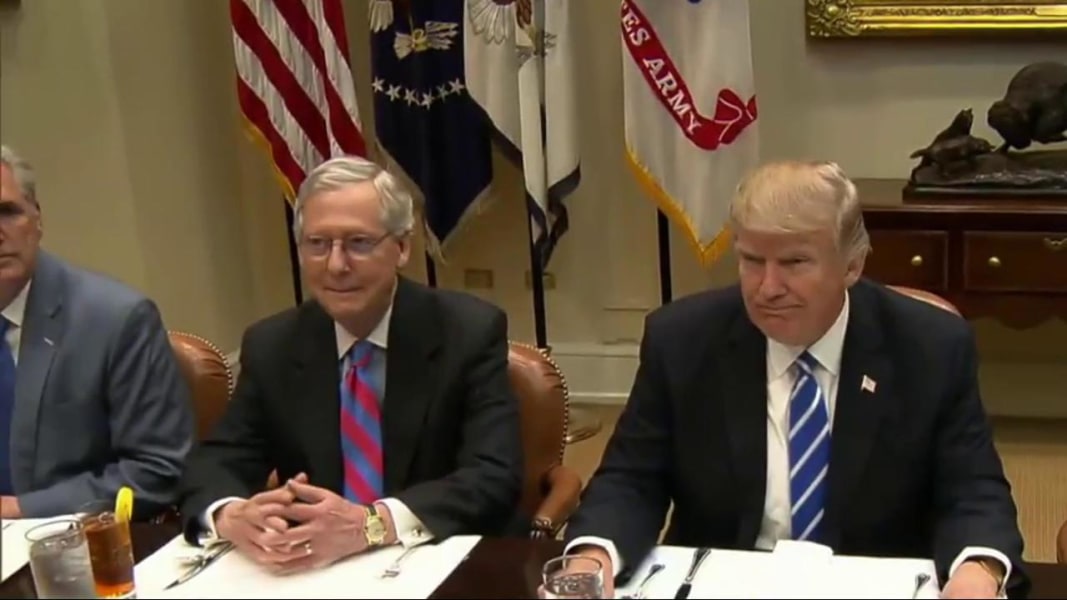Congress Leaves Town
Exhausted, Unsuccessful
and Frustrated
WASHINGTON — Congress is ready for a break.
For Republicans flush with election victory, 2017 was
supposed to be a year of winning, as then-candidate Donald
Trump often said, for an ambitious legislative agenda on
Capitol Hill. Seven months in, it hasn't worked out the way
they envisioned.
Republican leaders have failed to repeal and replace
Obamacare, they are behind schedule on reforming the
nation’s tax system and they haven't even broached plans
to boost the nation's infrastructure — three of their top
legislative priorities.
Now they are leaving town for their annual August recess,
feeling frustrated, exhausted and disappointed that a rare
opportunity to pass their agenda is being squandered. They
have control of Congress and the White House but little to
show for it so far.
On top of their own inability to make progress, there's a
hefty dose of Trump fatigue as Republican leaders have
had to maneuver alongside a drama-filled White House
led by a president who has shown little interest in the details
of policy or loyalty to them or the party.
While they have seen a few successes, namely the
of a Supreme Court justice, the past seven months of
intense action with little progress has taken a toll on those
who serve in Congress. Over the past week, energy was
noticeably low on Capitol Hill. Normally enthusiastic staffers,
walking through the halls on the heels of their bosses,
whispered to reporters, saying they really didn’t want to
be there — or they didn’t want their bosses to be there.
One Republican staffer on the Senate health committee
said that she has never been so mentally depleted. Sen.
Thom Tillis, R-N.C., said that while he’s excited to head
home to North Carolina for the month, it’s the staff who
especially needs the break, noting that for every hour a
member works, the staff works five more.
Democrats haven't made things easy, purposely slowing
floor activity to a near stand-still while Republicans tried to
dismantle Obamacare, the Democrats' biggest legislative
achievement in decades, further complicating Republican
efforts to help the president put his nominees in place. And
it's made the opposition as weary as the majority party.
“I think we all need a break from each other. I think
everybody needs to recharge their batteries,” said Sen. Brian
Schatz, D-Hawaii. “I think it was especially frustrating for
folks who don’t mind the work but want to see the product,
and this was not a productive first half of the year by any
measure.”
The prolonged fight over reforming health care took a lot out
of Republicans who are still trying to fulfill a seven-year
campaign promise of repealing Obamacare — a pledge that
no Democrat would participate in. After months of work, they
haven't come to agreement among themselves.
“Is it harder than we thought? Obviously I think health care
ended up being harder than we thought,” said Sen. Shelley
Moore Capito, R-W.V.
Health care’s woes have complicated the remainder of the
party’s agenda. They face a fall of must-pass legislation,
including lifting the debt ceiling, funding the government,
reauthorization of the low-income children’s health insurance
program, known as S-CHIP — all of which are supposed to be
completed by September 30.
“We’re way behind where we should be,” Sen. Mike
Rounds, R-S.D., admitted this week. “It’s been, I believe,
a learning experience for Republicans to understand that
they have a responsibility for governing.”
Republicans, who have control of both legislative chambers
and the White House for the first time since President George
W. Bush’s first term, miscalculated the complexities of governing
and unifying a party from diverse states, especially alongside a
president that is neither a traditional Republican nor a politician
and is brand new to the machinations of Washington.
Trump has been harshly critical of Senate Republicans since they
failed to pass health care, attempting to give them directions on
how to legislate and blaming them for foreign policy challenges.
But the advice hasn’t necessarily been welcome on Capitol Hill
and has done little to advance legislation or solve intra-party
differences. What it has done, however, is shown the president’s
lack of understanding of the legislative process, especially in the
Senate.
“I think it’s naïve to suggest that you just are able to move through
big ticket things in very short order. It requires a lot of work,” said
Sen. Lisa Murkowski, R-Alaska, one of the three Republicans who
helped to sink the GOP health care effort. “There’s good work
around here. But again it’s tough stuff. Just keep at it.”
Sen. John Thune, R-S.D., the GOP conference chairman, says
their relationship with the president is “evolving," and he expects
better outcomes in the future.
“We understand that in order for us to get accomplishments for the
American people we have to get bills on the president's desk that
he can sign into law. So it’s a relationship that is a work in progress,
but I guess my hope will be that we’ll get better outcomes than we
did on health care.”
Republicans hope that both they and the president have learned
valuable lessons as the next several months pile up with must-pass
legislation and the desire to take up tax reform, a complicated task
that took five years to write and pass in the 1980s.
Sen. James Lankford, R-Okla., said that he hopes the administration
has found its “sea legs.”
“This is a non-traditional president and he’s bringing in a lot of non-
traditional, non-government folks. So for them, they’re learning their role,
their spot, their staff,” Lankford said. “My hope is that’s practice, so they
can get us down to the fall, so everybody gets a little greater expertise.”
The fissures between Republicans and the White House continue to grow,
however, as time goes on. Congress passed a bill to sanction Russia
despite the White House’s opposition. Republican and Democratic
senators have introduced legislation to block Trump’s ability to fire
Special Counsel Robert Mueller.
Members of both parties are considering a new authorization of military
force, which would give Congress oversight of military intervention. And
the Senate won’t formally adjourn during the month of August to prevent
Trump from sidestepping the Senate and making any personnel
appointments when they are out of town.
“I hope (he learned) we’re a co-equal branch of government and we’ll
stand up to our prerogatives,” said Sen. Jeff Flake, R-Ariz. “No president
should expect for any senator or member of the House to be a rubber
stamp. We have our own franchise.”
Republicans can point to some accomplishments in the first seven months.
They saw the confirmation of conservative Supreme Court Justice Neil
Gorsuch — a huge priority for the Republican base. They also effectively
rolled back more than a dozen regulations from President Barack
Obama’s term.
The last day of the session this month was their most productive yet.
Democrats released their hold on President Donald Trump’s nominations,
doubling the number of appointees to his ranks to 122. And they passed
17 pieces of legislation (not including symbolic resolutions) on Friday in
a last-minute, bipartisan legislative blitz.


No comments:
Post a Comment
Thanks for commenting. Your comments are needed for helping to improve the discussion.